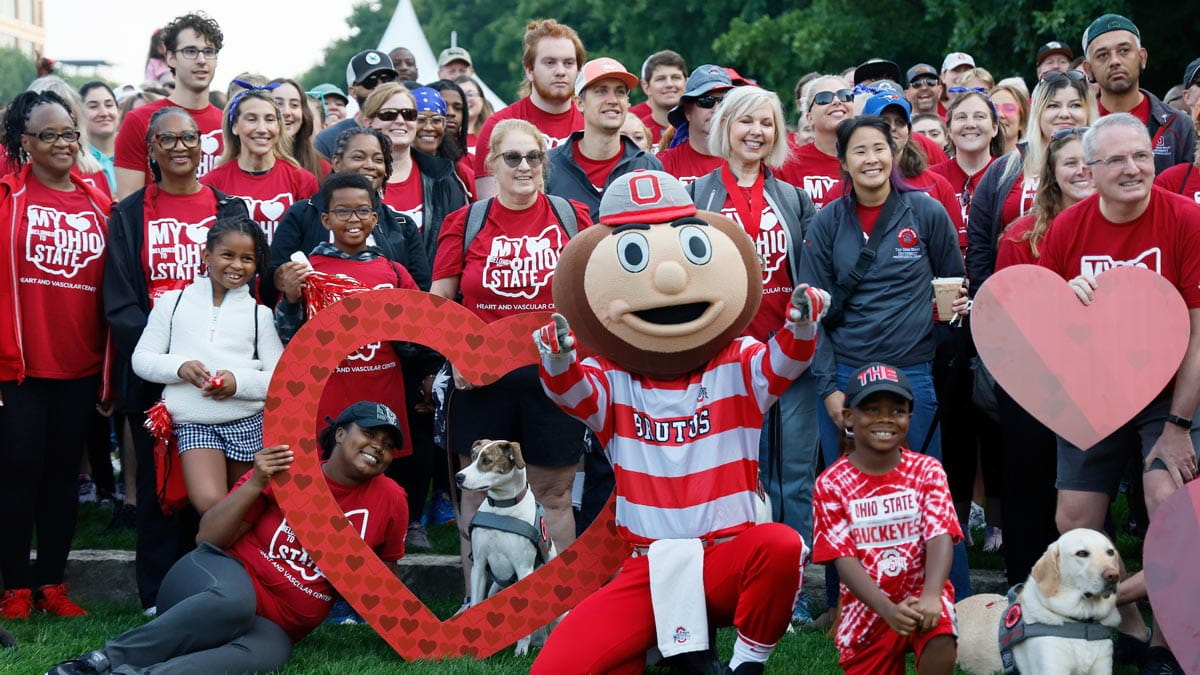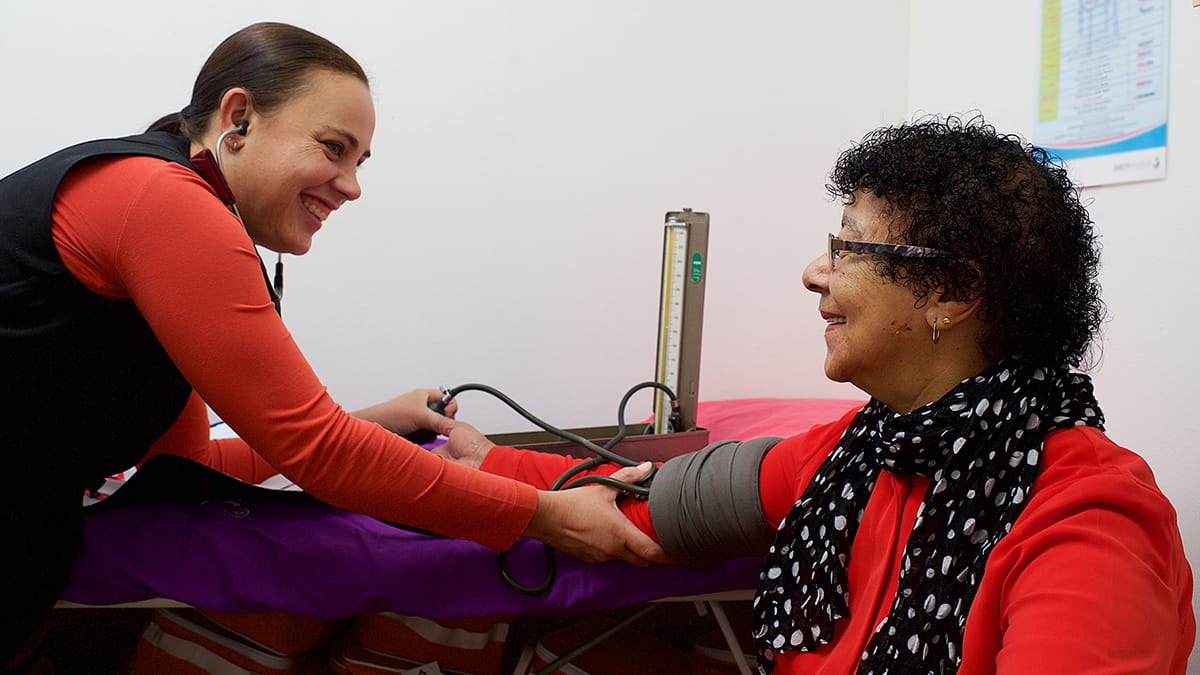4 keys to living a full life with heart failure

Heart failure is a serious, chronic condition that can affect all aspects of a patient’s life. But despite what the name suggests, heart failure does not have to mean a stopped heart or the end of a life.
“The term ‘heart failure’ can be misleading,” says Brent Lampert, DO, FACC, a cardiologist at Ohio State Richard M. Ross Heart Hospital. “It does not mean that the heart has completely stopped or failed.”
In reality, heart failure, which affects 6.5 million Americans over the age of 20, occurs when the heart either weakens and cannot pump blood or gets “stiff” and cannot fill adequately with blood, Dr. Lampert explains. This results in fluid backing up in the body, and other organs not getting as much blood as they should. Patients can have trouble breathing, fatigue and swelling.
A heart failure diagnosis can be scary and means adopting a new lifestyle, as well as accepting that you will likely always have the condition. But with the right mix of medication, diet and weight management, and family support, a life with heart failure can also be a full and happy one.
4 keys to living a full life with heart failure:
1. Take your medicine
Heart failure rarely goes away, but it can be treated with both medication and surgery.
“Treatment usually includes a combination of lifestyle modifications, medications and, sometimes, devices such as defibrillators,” Dr. Lampert says. “Heart failure is a chronic condition. Close contact and regular follow ups with a doctor are essential to success.”
Doctors usually begin heart-failure treatment with a combination of medications, such as beta-blockers and diuretics. Those meds help lower blood pressure, decrease fluid buildup and reduce the risk of abnormal heart rhythms.
“Always taking medications is critical to keeping your heart as healthy as possible,” Dr. Lampert explains. “Doses should not be skipped, even if you are feeling better.
Also, while it may be embarrassing to admit, you shouldn’t shy away from telling your doctor if you are having trouble affording medications. There may be other options.
In addition to medications, doctors may recommend surgical treatment that can help strengthen the heart or assist it in pumping blood. Examples of these surgeries include coronary bypass, where surgeons will bypass a blockage in an artery, implantable defibrillators, and—if the condition becomes too severe—a heart pump or heart transplant.
All of these procedures can be handled at Ohio State Ross Heart Hospital, helping patients avoid going to different hospitals for different surgeries.
2. Maintain a healthy weight with diet and exercise
According to Dr. Lampert, patients can make a few changes to their diet and exercise regimen to help strengthen their heart and live more comfortably. These lifestyle changes include:
- Decreasing salt intake: Salt can cause excess fluid retention and raise blood pressure, causing heart failure to get out of control.
- Limiting fluid intake: Patients often think they should drink lots of water to stay healthy, but excess fluid intake can overwhelm patients with heart failure, leading to fluid retention in the legs, lungs, abdomen and throughout the body.Patients with severe heart failure are often asked to drink less than two liters of fluid per day.
- Weigh yourself every day: Unexplained weight gain can be a sign of fluid retention. Patients should weigh themselves every day at the same time on the same scale and wearing the same amount of clothing. Weight increases of two pounds in one day or four pounds in a week should prompt a call to your doctor.
- Exercise: Exercising most days of the week will improve muscle and cardiovascular fitness, reducing many of the symptoms and problems caused by heart failure. Enrollment in cardiac rehabilitation can be appropriate for some patients to help develop a safe exercise plan.
3. Rely on friends and family members
Patients with heart failure need a strong support system of friends and family members who can help them with treatment. They can help in all aspects of a patient’s lifestyle, from helping fill pill boxes and monitoring daily weights, to encouraging daily exercise and cooking healthy meals.
“Friends and family play an important role in helping patients with heart failure,” according to Dr. Lampert. “They can help monitor symptoms and recognize worsening symptoms, of which the patient may not even be aware.”
Family can also help patients keep up with their diet and exercise regimen by learning how to prepare low-sodium foods, reading labels and keeping track of sodium intake. And to encourage patients with heart failure to remain as active as possible, it is a good idea to take walks together and participate in fun, aerobic activities like swimming, yoga and tennis.
4. Find the right care team
For patients seeking treatment for heart failure, the comprehensive, multidisciplinary heart program at Ohio State offers all these options and more.
“Ohio State is the only program in central Ohio that can offer heart transplantation and has the largest number of possible research trials,” Dr. Lampert explains. “Our team can provide a comprehensive assessment of your condition and individualize the right treatment plan.”
The heart team at Ross Heart Hospital, which includes heart-failure specialty physicians, nurse practitioners, nurses, pharmacists, cardiac rehabilitation specialists, social workers, heart surgeons and dietitians, has helped thousands of patients live a full and happy life. Bob Garner, who was on heart failure medication for eight years before seeking a second opinion at Ohio State, is one of them.
“I basically didn’t have a quality of life until I went to Ohio State,” he says. “I couldn’t walk 10 feet without wanting to collapse.”
Garner’s doctors recommended a left ventricular assist device (LVAD), a mechanical pump attached to the heart that helps it pump blood to the rest of the body. The LVAD gave Garner’s heart the help and rest it needed while he awaited a heart transplant, which he received almost three years ago at the Ross Heart Hospital.
“After the heart transplant, I can do pretty much anything I want, whether that is throwing a softball outside, playing cornhole—whatever whatever I want to do now, I can do!”
And Garner says he can do all of this thanks to his heart donor and his care team at Ohio State.
“The people at Ohio State are absolutely the greatest. I became friends with a lot of them, whether they were the nurses, the cardiac rehab, the trainers, the doctors, I can’t say enough how great they are.”




